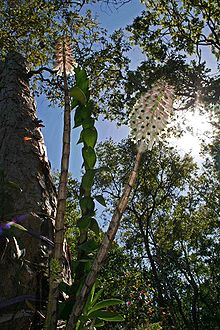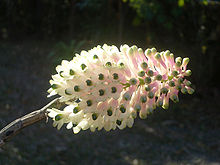- Coelandria smillieae
-
Coelandria smillieae 
Photo by Luna Morikawa. Scientific classification Kingdom: Plantae (unranked): Angiosperms (unranked): Monocots Order: Asparagales Family: Orchidaceae Subfamily: Epidendroideae Genus: Coelandria Species: C. smillieae Binomial name Coelandria smillieae
(F.Muell.) Fitzg. (as 'smilliea')Synonyms - basionym: Dendrobium smillieae F.Muell. Fitzgerald, R.D. (1882), Australian Orchids 1(7): 2nd plate [comb. nov.]
- Callista smillieae (F.Muell.) Kuntze
- Pedilonum smillieae (F.Muell.) Rauschert
- Cepobaculum smillieae
Coelandria smillieae, commonly known as the Bottlebrush Orchid, is found in Queensland, Australia, from some of the Torres Strait Islands, though Cape York Peninsula to Townsville in the south at altitudes of 500-700 metres. It is also found in New Guinea and Indonesia.[1]
Contents
Description
This widespread and common orchid grows as an epiphyte on a range of trees - usually in low-lying areas, swamps and rainforest, and to moderate heights on the ranges. It prefers trees which are exposed to sunlight. It commonly grows on trees such as Lophostemon suaveolens (Swamp Turpentine or Swamp Box) which have loose papery bark. The roots of the orchid penetrate below the bark and form large mats which are well protected beneath the bark.[2]
It also grows as a lithophyte on rocky outcrops and rock faces. It forms large clumps with canes 15-100 cm long and 1-2 cm across. The spectacular pink and cream flowers with green tips are 20-25 mm long and are found at the end of erect canes or racemes about 80-150 mm. The flowers are semi-tubular, waxy and the labellum with the apex a dark green.[3]
A white variety is found in the Sepik swamps in New Guinea. In Australia it flowers between August and November.[4]
The flowers are pollinated by the Yellow Honeyeater (Lichenostomus flavus) also known locally as the Canary Honeyeater, which hovers in front of the flowers while feeding on the nectar.[5]
Footnotes
References
- Beasley, John (2006). Plants of Tropical North Queensland the Compact Guide. Footloose Publications. Kuranda, Qld., Australia. ISBN 1-876617-13-6.
- Beasley, John. (2009). Plants of Cape York: The Compact Guide. John Beasley, Kuranda, Qld., Australia. ISBN 978-0-9806863-0-2.
- Jones, David L. (2006). A complete Guide to Native Orchids of Australia, including the island territories. New Holland Publishers, Frenchs Forest, N.S.W. 2086 Australia. ISBN 1-877069-12-4.
- Teoh, Eng-Soon. (2005) Orchids of Asia. New & Expanded Third Edition. Times Editions - Marshall Cavendish. ISBN 978-9812610157.
External links
Categories:- Flora of Queensland
- Orchidaceae of Australia
- Orchid species
- Epidendroideae
- Epiphytes
Wikimedia Foundation. 2010.

